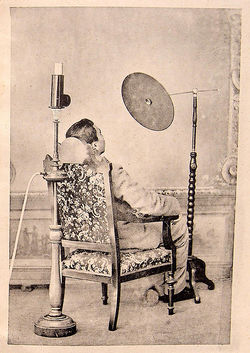Hypnosis
Hypnosis is a somewhat controversial method of reaching the unconscious mind in an attempt to fix certain issues someone may have. These issues may range from depression, anxiety, phobias, eating problem, or addiction. A patient's habits and emotions can only be reached in in this way, and because of this, training the brain can be accomplished. Although there are many dangers to hypnosis, it can be extremely beneficial. Dangers may include the physician not being properly certified, or the physician causing mind control that the patient did not ask for. If the hypnotist is qualified, then hypnosis can be an extremely beneficial way to solve specific issues that modern medicine can't help.
How Hypnosis Works
In short terms, hypnosis is a way to connect with the unconscious mind and communicating by specific messages to the patient. Hypnosis, although effective usually, is very hard to explain. Many different functions and controls of the brain are not completely understood. Theories suggest that hypnosis causes a change in the brain, and another idea suggests that hypnosis' effects are closely linked to the placebo effect. The placebo effect is a fake medical treatment thought to be real by those it is being administered to and used to trick patients into believing that they are cured, when in reality nothing has taken place and it is all mind control. However, even the placebo effect is called into question on how it actually works. By reaching the unconscious mind, a patient's emotions, habits, and their responses to life are able to be reached. This is usually the are in which problems occur, and suppressed memories lie. The unconscious mind is more in control than the conscious mind, and because of this, even though a person may be logical and sensible, their unconscious mind will control habits and behavior. This is where hypnosis becomes helpful. The unconscious decisions that the brain makes can be reprogrammed to update the thought process of specific actions. Hypnosis can help to change perspective on problems, and help with finding a solution. This way instead of believing one thing, the mind is able to believe something else that is much more beneficial. The unconscious also is able to control the autonomic processes in the body such as breathing, heart rate, immune system etc. Therefore hypnosis can also be used to help in use of healing. [1]
Popular Perception
Views on hypnosis vary vastly from person to person. Many believe that it is a helpful to that can change an individual's life for the better. On the other hand, many believe that hypnosis is a very negative and damaging procedure. On the positive side of things, hypnosis can alter one's thinking in a specific situation for the better. For example, if someone is a addicted to eating a certain food, a hypnotist may be able to alter the brain receptors when the individual thinks about that specific food to make it sound terrible. Other examples include aiding in the drop of headaches in children, and also helping to quit smoking more effectively than nicotine replacement.
Common Practice
Today, hypnosis, although not a widely used practice, is an accepted way of reducing pain, anxiety, and solving other common problems. Hypnosis helps many people in relieving a variety of mental issues by putting them in the most relaxed state of consciousness. A hypnotist may use hypnotism on a patient for different mental problems and behavioral problems. A patient may even be able to hypnotize themself to deal with pain, depression, or sleeping problems. Although somewhat controversial, hypnosis can be extremely beneficial for the patient, and help in ways that common medicine cannot. By interacting with the unconscious mind, a hypnotist is able to get through to a patient and help to change them for the better. [2]
Dangers of Hypnosis
There are many dangers and complications that come with hypnosis. Although many hypnotists are well trained in their area, some may be only a novice, and because of this the hypnosis may not work correctly. For example, they could give a strange command that the patient never wanted, or they could attempt to help in an area that they are not certified in. Patients will accept suggestions of the hypnotist as true facts and more than mere suggestions. In some strange cases, the hypnotist is able to embed false memory into patients, convincing them that things happened that didn't. The patient will believe that these are suppressed memories, and these can cause a lot of personal complications. Remember, the hypnotist is dealing with the unconscious mind, and they are in complete control. It is important to go through someone with high credentials, and someone trustworthy or else one is susceptible to a plethora of complications. Also, the hypnotist should not remove symptoms altogether. Instead they should help train the brain for a better response to the problem. [3]
Video
A CNN report on if hypnosis is real or fake.
References
- ↑ Smith, Brendan. Hypnosis today American Psychological Association. Web. Published Jan. 2011.
- ↑ Kouguell, Maurice . Possible Dangers and Complications Brookside Center for Counseling and Hypnotherapy. Web. accessed 4 April 2014
| ||||||||||||||||||||

